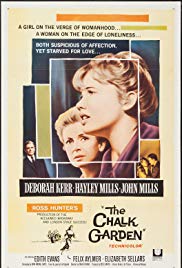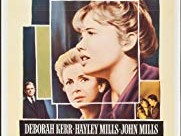The Chalk Garden **** (1964, Deborah Kerr, Hayley Mills, John Mills, Edith Evans, Elizabeth Sellars) – Classic Movie Review 8653
Edith Evans triumphs as old lady Mrs St Maugham, and the witty 1964 British drama film The Chalk Garden is an affecting and appealing experience.
Director Ronald Neame’s gloomy but witty 1964 British drama The Chalk Garden stars Deborah Kerr, who plays a governess again after The Innocents (1961), this time Miss Madrigal living in a seaside household that comprises old lady Mrs St Maugham (Edith Evans), her troubled teenage granddaughter Laurel (Hayley Mills) and servant Maitland (John Mills). The trouble-making Laurel sets out to expose Miss Madrigal’s mysterious past, while Laurel’s divorced pregnant mother Olivia (Elizabeth Sellars) tries to reclaim her.
John Michael Hayes’s painstaking adaptation of Enid Bagnold’s highly emotional and weepy play (from her own novel) gives the Best Actress in a Supporting Role Oscar-nominated Evans (repeating her stage role) a grand opportunity which she eagerly grabs. However, Kerr gives a rather subdued performance and both Millses perhaps lack the full weight of conviction, despite their familiar casting.
Nevertheless, Evans triumphs, Sellars, Felix Aylmer and Lally Bowers score strongly in support and The Chalk Garden is an affecting and appealing experience. It was Golden Globe nominated for Best Motion Picture – Drama.
Also in the cast are Felix Aylmer, Elizabeth Sellars, Lally Bowers, Toke Townley and Tonie MacMillan.
Despite four BAFTA Film Award nominations, there were surprisingly no wins: nominations for Best British Actress (Evans), Best British Actress (Kerr), Best British Art Direction Colour (Carmen Dillon) and Best British Cinematography Colour (Arthur Ibbetson).
Astoundingly, it was a hit in America. The film grossed $180,000 in its second week at Radio City Music Hall in New York City, a record for Memorial Day week, and it became the number one film in the US. It earned $3.25 million in US / Canada cinema rentals.
The Chalk Garden is directed by Ronald Neame, runs 106 minutes, is made by Quota Rentals Limited, Ross Hunter Productions and Universal Pictures, released by Universal Pictures (US) and Rank Film Distributors (UK), is written by John Michael Hayes, based on Enid Bagnold’s play, is shot in Technicolor by Arthur Ibbetson, is produced by Ross Hunter, is scored by Malcolm Arnold and is designed by Carmen Dillon.
Bagnold’s Broadway play opened 26 October 1955 at the Ethel Barrymore Theater and ran for 182 performances. Gladys Cooper created the role of Mrs St Maugham on stage and wanted to do the movie version. Neame took her to Claridges Hotel in London to meet producer Ross Hunter, but later Evans won him over.
Producer Don Hartman had bought the rights to the 1955 play for Paramount Pictures and took over the property when he left Paramount in 1956 to become an independent producer, but he died in 1958. In 1960, producer Ross Hunter said that he now had the rights to the play, having ‘forced the studio [Universal] to buy it.’ He said that worked with a writer to make the script ‘more commercial’.
Ronald Neame said he thought Hayley Mills ‘too kittenish. She should have been far more dangerous. I also hated the music. The play is filled with epigrams. Every time one was uttered, that crashing music would swell up.’
The cast are Deborah Kerr as Miss Madrigal, Hayley Mills as Laurel, John Mills as Maitland, Edith Evans as Mrs. St Maugham, Elizabeth Sellars as Olivia, Felix Aylmer, Lally Bowers, Toke Townley and Tonie MacMillan.
© Derek Winnert 2019 Classic Movie Review 8653
Check out more reviews on http://derekwinnert.com



